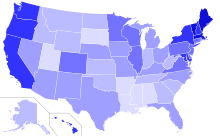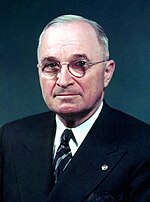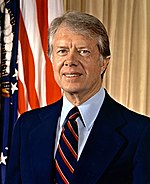Factions in the Democratic Party (United States)
[1]: 91 While the resurgence of conservatism and the Third Way of Bill Clinton's New Democrats briefly weakened the influence of modern liberalism, Barack Obama acted as an ideological bridge.
[2][3] The key legislative achievement of the Obama administration, the passage and enactment of the Patient Protection and Affordable Care Act (Obamacare), was generally supported among liberal Democrats.
[5] Under Obama, Democrats achieved an expansion of LGBT rights and federal hate crime laws, rescinded the Mexico City policy (later reinstituted by President Donald Trump) and the ban on federal taxpayer dollars to fund research on embryonic stem cells, and implemented the Joint Comprehensive Plan of Action and the Cuban thaw.
In 2016, Democratic presidential nominee Hillary Clinton eschewed her husband's "New Covenant" centrism and pursued more liberal proposals, such as rolling back mandatory minimum sentencing laws, a debt-free college tuition plan for public university students, and a pathway to citizenship for undocumented immigrants.
[15] In reaction to angst following Reagan's landslide victory over liberal Democrat Walter Mondale in the 1984 United States presidential election, the Third Way movement was formed.
[16][17] During the 1992 United States presidential election, Clinton and running mate Al Gore ran as New Democrats who were willing to synthesize fiscally conservative views with the more culturally liberal position of the Democratic Party ethos, or to harmonize center-left and center-right politics.
[19][20][21] The Blue Dog Coalition was originally founded in 1995 as a group of conservative Democrats focused on fiscal responsibility.
Historically, progressives were not limited to the Democratic Party, and the modern progressives in the Democratic Party are influenced by the activist reformism of Theodore Roosevelt (particularly the Square Deal and New Nationalism, which in turn influenced the New Freedom and the New Deal) and Herbert Croly (who rejected the thesis that the liberal tradition was inhospitable to anti-capitalist alternatives), as well as La Follette family (particularly Robert M. La Follette who founded the Progressive Party in 1924) and former Franklin D. Roosevelt's Vice President Henry A. Wallace, who founded another Progressive Party in 1948 after denouncing the anti-Communist foreign policy of the liberal President Harry S.
[26] Unlike some members of the historical progressive wing, such as Bryan who held fundamentalist religious views,[26] modern progressives in the Democratic Party are secular and culturally liberal on social issues like race and identity, where they draw inspiration from the Civil Rights Act of 1964 and the Voting Rights Act of 1965 proposed by President Kennedy, enacted by President Johnson, and advocated for by Martin Luther King Jr.[27] While it does not transcend the political philosophy of modern liberalism, the progressive wing has fused tenets of cultural liberalism with the economic left-leaning traditions of the Progressive Era, as well as drawing more robustly from Keynesian economics, left-wing populism, and democratic socialism/social democracy, particularly through Franklin D. Roosevelt's Four Freedoms.
[30] While there are differences between them, both historical progressivism and the modern progressive movement share the belief that free markets lead to economic inequalities, and therefore that the free market must be aggressively monitored and regulated with broad economic and social rights to protect the working class.
[46][47] Former Democratic representatives, such as Ron Dellums,[48] David Bonior, Major Owens,[48] John Conyers, Jerry Nadler, Danny K. Davis,[41] Shri Thanedar, Summer Lee,[49] Cori Bush,[48] and Jamaal Bowman,[50] were also affiliated with the DSA.
Jeffersonians, named after founding father Thomas Jefferson, was a political movement in the late 18th and early 19th centuries.
[1]: 89–90 Other than Jackson, notable Jacksonian Democrats include presidents Martin Van Buren and James K. Polk.
[1]: 89 The Democrats led by the Jacksonian faction won all presidential elections but two (1840 and 1848), and dominated national politics until the early 1860s.
While not an explicit political faction, it impacted many Democratic party ideals though its promotion of capitalism and manifest destiny, and broke with the agrarian and strict constructionist orthodoxies of the past; it embraced commerce, technology, regulation, reform, and internationalism.
This happened because he had aliened fellow Northern Democrats when he signed the Kansas–Nebraska Act, which was drafted by Douglas, that effectively repealed the Missouri Compromise of 1820 and allowed slavery into the Kansas Territory.
[62] Many anti-slavery Northern Democrats voted for Van Buren in 1848, and paved the way for the win of the Whig Party and the election of Zachary Taylor.
They promoted the ideas of agrarianism inspired from Jacksonian thought that appealed to many poor farmers in border states.
[1]: 90 Despite this, the War Democrats allied with Republicans under the National Union ticket to compete in the 1864 United States elections.
Although he enacted a series of progressive reforms that came to define modern liberalism, Wilson de facto imposed racial segregation in the federal government.
It was dominant in Congress from 1937 to 1963, until President Lyndon B. Johnson signed the Civil Rights Act of 1964 into law.
[1]: 91–92 [66] It was only until after World War II that the Democratic Party began to support civil rights towards racial equality, starting with President Harry S. Truman desegregating the United States Armed Forces (Executive Order 9981) in 1948.
Depression-bred New Deal reforms, war-induced demand for labor in the North, perfection of cotton-picking machinery, and civil rights legislation and court decisions finally ... destroyed the plantation system, undermined landlord or merchant hegemony, diversified agriculture and transformed it from a labor- to a capital-intensive industry, and ended the legal and extra-legal support for racism.
In 1968, President Lyndon B. Johnson's policies in Vietnam were unpopular and divided the party, eventually leading to his withdrawal from the presidential race.
[72] The traditional conservative Democratic faction lost much of its influence in the 21st century as the South politically realigned towards the Republican Party.







